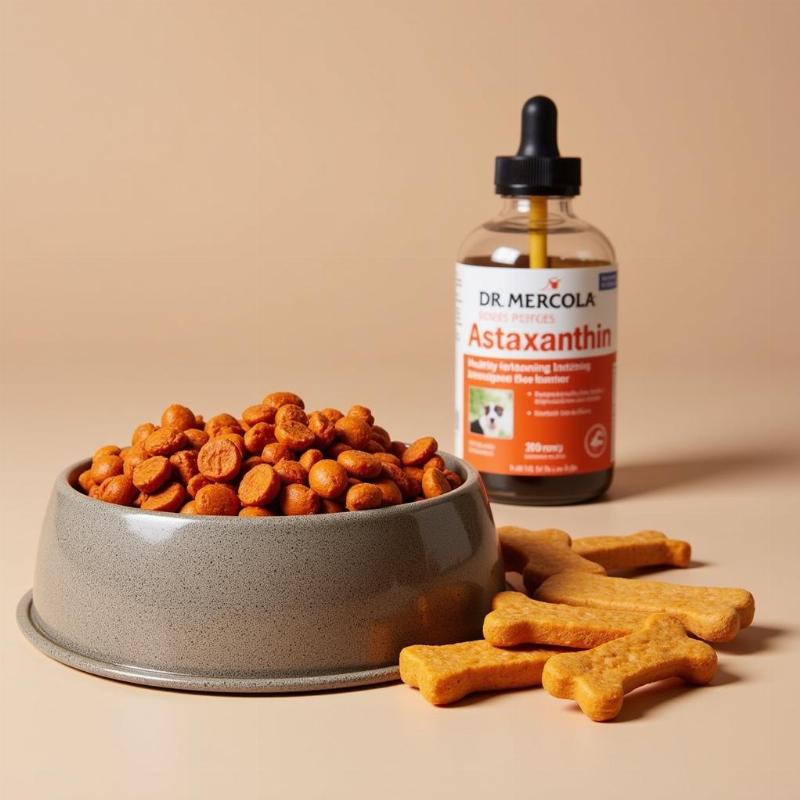Dr. Mercola astaxanthin for dogs has gained popularity among pet owners seeking natural ways to support their canine companion’s health. But what exactly is astaxanthin, and how can it benefit your furry friend? This comprehensive guide will explore the potential advantages of Dr. Mercola’s astaxanthin supplement for dogs, addressing common questions and concerns.
Understanding Astaxanthin and its Potential Benefits for Dogs
Astaxanthin, a powerful antioxidant derived from microalgae, is often touted for its potential health benefits. For dogs, it’s believed to offer support for various bodily functions, including immune system health, skin and coat condition, eye health, and joint mobility. While research is ongoing, many pet owners have reported positive results after supplementing their dog’s diet with astaxanthin.
How Can Dr. Mercola Astaxanthin Help My Dog?
Dr. Mercola’s astaxanthin supplement is formulated specifically for dogs, ensuring appropriate dosage and bioavailability. It’s often used to support:
- Immune System: Astaxanthin’s antioxidant properties can help combat free radicals, potentially bolstering the immune system.
- Skin and Coat: Some pet owners report improved coat shine and reduced skin issues after using astaxanthin.
- Eye Health: Astaxanthin may offer protection against oxidative stress in the eyes, potentially supporting overall eye health.
- Joint Mobility: Its anti-inflammatory properties could contribute to improved joint comfort and mobility, especially in older dogs.
Choosing the Right Astaxanthin Supplement for Your Dog
When considering astaxanthin for your dog, opting for a high-quality product like Dr. Mercola’s is crucial. Look for supplements that:
- Are derived from natural sources.
- Are specifically formulated for dogs.
- Have clear dosage instructions.
- Are free of unnecessary fillers or additives.
Is Dr. Mercola Astaxanthin Safe for My Dog?
While astaxanthin is generally considered safe for dogs, it’s essential to consult with your veterinarian before adding any new supplement to your dog’s diet. They can advise on the appropriate dosage based on your dog’s individual needs and health status.
Incorporating Dr. Mercola Astaxanthin into Your Dog’s Routine
Once you’ve discussed astaxanthin with your vet, incorporating it into your dog’s routine is usually straightforward. Follow the recommended dosage instructions carefully. Some pet owners find it easiest to mix the supplement with their dog’s food.
What if My Dog Doesn’t Like the Taste?
If your dog is picky, try hiding the supplement in a tasty treat or mixing it with a small amount of wet food.
 Dr. Mercola Astaxanthin with Dog Food
Dr. Mercola Astaxanthin with Dog Food
Conclusion: Supporting Your Dog’s Well-being with Dr. Mercola Astaxanthin
Dr. Mercola astaxanthin for dogs offers a potential natural way to support various aspects of your canine companion’s health. From immune system support to skin and coat health, and eye and joint support, this antioxidant supplement has gained attention among pet owners seeking holistic approaches to canine wellness. Remember to consult with your veterinarian before starting any new supplement regimen for your dog.
FAQ:
- How much Dr. Mercola astaxanthin should I give my dog? Consult with your veterinarian for the appropriate dosage based on your dog’s individual needs.
- Are there any side effects of astaxanthin for dogs? Astaxanthin is generally considered safe, but some dogs may experience mild digestive upset.
- Where can I purchase Dr. Mercola astaxanthin for dogs? It’s available online and at select pet supply stores.
- Can I give my dog astaxanthin intended for humans? No, it’s crucial to use a supplement specifically formulated for dogs.
- How long does it take to see results from astaxanthin? Results may vary, but some pet owners report noticeable improvements within a few weeks.
- Can I give astaxanthin to my puppy? Consult with your veterinarian before giving any supplements to puppies.
- Is astaxanthin a replacement for prescribed medications? No, astaxanthin should not be used as a replacement for medications prescribed by your veterinarian.
Beautdogs.us is your trusted source for comprehensive and engaging information on dog care and companionship in the US. We offer expert advice on breeds, grooming, nutrition, and overall well-being. Whether you’re a new dog owner or a seasoned pro, Beautdogs.us provides valuable resources to help you navigate the joys and responsibilities of dog ownership. Contact us for all your dog-related inquiries! Email: [email protected], Phone: +1 501-555-7529.